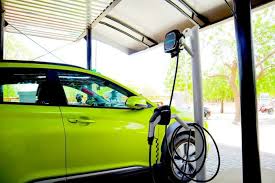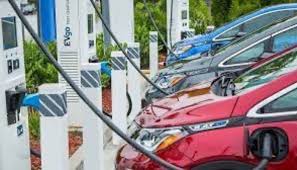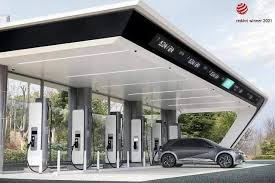![]()
If you’ve landed on this article page, you’re probably searching for a
good business idea—an idea that’s light on the pocket but heavy on
returns, promising both a fulfilling journey and potential profit.
|
How to start Electric Vehicle Charging Stations in Nigeria
An Electric Vehicle Charging Station, also known as an EV
charging station or EVSE (Electric Vehicle Supply Equipment), is
a specialized infrastructure that supplies electric energy to
recharge electric vehicles. It provides a connection point for
the vehicle’s charging cable to transfer electricity from the
grid or a renewable energy source to the vehicle’s battery for
efficient and convenient charging.
Strategically, we must consider how these advancements can be
effectively integrated into our existing infrastructure.
Collaborations between stakeholders—government, private sectors,
and technology providers—will be critical in ensuring a robust
charging network that can support the anticipated increase in
electric vehicle usage. As we move forward, leveraging these
technological developments will enable us to create a
sustainable EV market that meets the needs of Nigerian consumers
while contributing to our broader environmental goals.
Offering 24/7 Customer Support: Establishing a dedicated
customer support team or outsourcing to a reputable service
provider
Implementing multiple channels for customer inquiries, including
phone, email, and online chat
Ensuring prompt and efficient responses to customer queries,
technical issues, or payment concerns
The successful adoption of electric vehicles in Nigeria hinges
greatly on the establishment of a reliable charging
infrastructure. This infrastructure is crucial for effective
charging technology deployment, guaranteeing that users can
access charging stations conveniently and efficiently. By
focusing on infrastructure development, we can notably improve
user accessibility, particularly in urban planning initiatives
that prioritize electric vehicle integration.
Feasibility Study Process
Conducting a feasibility study for electric vehicle charging
stations in Nigeria involves several critical steps that
guarantee our approach is both strategic and practical.
Initially, we focus on site selection, evaluating locations
based on accessibility, visibility, and proximity to existing
infrastructure. This confirms we're targeting areas with high
potential usage.
Next, we plunge into cost estimation, analyzing installation and
operational expenses to determine potential return on
investment. Concurrently, a thorough technology assessment is
conducted to identify the most suitable charging solutions that
correspond with market trends and user experience preferences.
Types Of Electric Vehicle Charging Station In Nigeria
Level 1 Chargers: Level 1 chargers, also known as trickle
chargers, are the most basic and commonly available chargers for
electric vehicles. These chargers use a standard household
120-volt AC outlet to provide a slow charging rate of around 3
to 5 miles of range per hour of charging. Level 1 chargers are
typically included with the purchase of an electric vehicle and
are suitable for overnight charging at home.
Level 2 Chargers: Level 2 chargers offer faster charging speeds
compared to Level 1 chargers. They require a dedicated 240-volt
AC electrical circuit, similar to a clothes dryer or electric
stove outlet. Level 2 chargers can provide charging rates
ranging from 10 to 60 miles of range per hour, depending on the
vehicle’s on-board charger and the power capacity of the
charging station. These chargers are commonly used in
residential, commercial, and public settings.
DC Fast Chargers: DC Fast Chargers, also known as Level 3
chargers, provide the fastest charging rates for electric
vehicles. These chargers use direct current (DC) power and can
charge an electric vehicle to 80% capacity in as little as 20 to
30 minutes, depending on the vehicle’s battery capacity and
charging capabilities. DC Fast Chargers require specialized
infrastructure and higher power capacity, making them suitable
for highway rest stops, commercial areas, and public charging
stations.
Wireless Charging: Wireless charging, also known as inductive
charging, is an emerging technology that enables electric
vehicles to charge without physical cable connections. It
involves using electromagnetic fields to transfer energy between
a charging pad or plate on the ground and a receiver coil in the
vehicle. Wireless charging offers convenience and eliminates the
need for manual plugging and unplugging of cables. However, it
is still in the early stages of development and implementation.
Portable Chargers: Portable chargers, also called mobile
chargers or EVSE (Electric Vehicle Supply Equipment), are
compact and lightweight chargers that can be easily carried and
used in different locations. These chargers usually operate at
Level 1 or Level 2 charging rates and are suitable for electric
vehicle owners who need flexibility and mobility in charging
their vehicles.
Battery Swapping: Battery swapping is an alternative charging
method where depleted batteries are quickly exchanged for fully
charged ones. This approach eliminates the time required for
charging and allows for immediate battery replacement. Electric
vehicle manufacturers that support battery swapping have
specific designs that enable easy removal and replacement of the
battery pack. While not as prevalent as traditional charging
methods, battery swapping provides a fast and efficient option
for extending the range of electric vehicles.
How To Install Electric Vehicle Charging Station In Nigeria or
Africa
Determine Charging Station Type and Capacity: Choose the
appropriate charging station type based on your target market
and location. Consider factors such as AC Level 2, DC Fast
Charging, or a combination of both. Determine the charging
capacity (kilowatts) based on the power availability and
anticipated demand.
Obtain Necessary Permits and Approvals: Research and obtain the
required permits and approvals from local authorities, utility
companies, and relevant regulatory bodies. This may include
electrical permits, environmental clearances, and compliance
with safety standards and building codes.
Plan Charging Station Location and Infrastructure: Identify a
suitable location for your charging station considering factors
like visibility, accessibility, proximity to power supply, and
available parking space. Assess the electrical infrastructure
and ensure it can support the charging station’s power
requirements.
Procure and Install Charging Equipment: Select reliable charging
equipment from reputable suppliers that comply with
international charging standards. Install charging units,
connectors, and cables according to the manufacturer’s
instructions and safety guidelines.
Connect to Power Supply: Coordinate with the local utility
company to connect the charging station to the power supply
grid. Install the necessary electrical connections,
transformers, and meters to facilitate the flow of electricity
to the charging station.
Implement Network and Payment Systems: Integrate network and
software solutions to enable user authentication, payment
processing, and remote monitoring of charging sessions. Set up
user-friendly mobile apps or RFID card systems for users to
access and pay for charging services.
Perform Testing and Commissioning: Thoroughly test the charging
station and all its components to ensure proper functionality
and safety. Conduct comprehensive testing for electrical
integrity, communication systems, and user interfaces. Obtain
the necessary certifications and approvals.
Promote and Market Your Charging Station: Develop a marketing
strategy to create awareness and attract customers to your
charging station. Utilize online platforms, social media,
collaborations with local businesses, and partnerships with
electric vehicle manufacturers to promote your services.
Maintain and Monitor: Establish a regular maintenance schedule
to ensure the optimal performance of your charging station.
Monitor charging sessions, track usage patterns, and address any
technical issues promptly. Provide customer support channels for
assistance and feedback.
Types Of Equipment & Tools Used In The Electric Vehicle Charging
Station Business In Nigeria
Equipment Used to Process, Package, and Supply Electric Vehicle
Charging Station Business in Nigeria and Africa: Step-by-Step
Guide
Charging Station Units: The main equipment used in an electric
vehicle charging station business is the charging station unit
itself, which includes the charging infrastructure, connectors,
and cables.
Transformers: Transformers are used to step up or step down the
voltage levels to match the charging station’s power
requirements and the local electrical grid.
Distribution Panels: Distribution panels help distribute power
to different sections of the charging station, ensuring
efficient and safe electrical distribution.
Circuit Breakers: Circuit breakers protect the charging station
from overcurrent and short-circuit situations, enhancing the
safety and reliability of the system.
Metering Systems: Metering systems measure the energy
consumption during charging sessions, enabling accurate billing
and monitoring of charging activities.
Electrical Panels and Enclosures: Electrical panels and
enclosures provide a secure housing for electrical components,
protecting them from environmental factors and unauthorized
access.
Network and Software Systems: Network and software systems
enable remote monitoring, data management, user authentication,
and payment processing for charging services.
RFID Cards and Readers: RFID (Radio Frequency Identification)
cards and readers are used for user authentication and access
control at the charging station.
Communication Systems: Communication systems facilitate
real-time communication between the charging station and other
stakeholders, including mobile apps, software platforms, and
backend systems.
Safety Equipment: Safety equipment, such as fire extinguishers,
emergency stop buttons, and warning signs, is essential to
ensure the safety of users and personnel at the charging
station.
Maintenance Tools: Various maintenance tools, including
electrical testing equipment, cable connectors, and
troubleshooting devices, are necessary to perform regular
inspections and repairs.
Signage and Display Systems: Signage and display systems provide
information and instructions to users, including charging rates,
charging availability, and station operating hours.
Backup Power Systems: Backup power systems, such as generators
or battery storage, can be employed to ensure continuous
charging services during power outages or grid failures.
Customer Support Systems: Customer support systems, including
helpdesk software, communication channels, and trained
personnel, are crucial for providing assistance to users and
addressing their inquiries or concerns.
With the rise of electric vehicles, there is a need for a robust
charging network to alleviate range anxiety and facilitate
long-distance travel. By strategically positioning charging
stations in convenient locations, leveraging renewable energy
sources, and implementing efficient charging methods, businesses
can cater to the evolving needs of electric vehicle owners.
Get our Practical Guide on how to start Electric Vehicle
Charging Stations in Nigeria. If you're considering venturing
into the world of sustainable energy and want to start an EV
charging stations business, you've come to the right place.
During our Training, we will provide you with the key steps and
insights to help you successfully establish and grow your EV
charging business.
|







